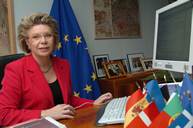eGovernment in context of i2010
(Welcome address to the ISSS/LORIS/V4DIS 2005 Conference from Viviane Reding)
Excellencies, Ladies and Gentlemen,

I am very pleased to address you in my role of Commissioner for
Information Society and Media.
I thank you for giving me the opportunity to open this eighth edition
of ISSS/LORIS in Hradec Kralove. I am very impressed that over the years, this conference
organised in the Czech Republic has become a major event for more than 2000
representatives from local, regional and national governments and parliaments, information
and communication technologies suppliers and experts, coming from all 25 Member States.
Lisbon
As you may know, the focus in the Lisbon Strategy is on growth and jobs
in order to maintain the prosperity needed to preserve the European quality of life and
solidarity.
In this process, the importance of ICT has been recognised from the
beginning, and in particular in the face of an ageing population and increasing
international competition.
Both public and private sector have to take advantage of new ICT-based
services, application and content and create a dynamic environment, giving all citizens
the opportunity to participate into the global information society.
i2010
My new initiative i2010 (or European Information Society 2010) intends
to build on the current wave of technological and economic development.
My aim is to make sure that Europe gets the full benefits in terms of
prosperity, jobs and growth by encouraging investments in ICT and promoting their take-up
through the economy. ICT should be more closely tailored to citizens' needs and
expectations.
I will do this by:
- Promoting a borderless European information space with the aim of establishing an
internal market for electronic communications and digital services
- Stimulating innovation through investment in research, the development and deployment in
ICT and by encouraging the industrial application of ICT
- Making the European Information Society as inclusive and accessible as possible.
eGovernment
eGovernment makes a key contribution to i2010.
eGovernment is about efficient and effective public services and about
ICT that enables citizens to participate fully in socially and culturally creative
communities including the democratic process.
Most European countries have been actively reforming their public
sectors for the last decade. Initially the problem seemed to be relatively
straightforward. It consisted of the use of information and communication technologies for
improving efficiency. Increasingly other issues became important such as reforming
management practices and the changing relationship between state and citizen.
All European countries now have a strategy for modernisation of their
administration that includes eGovernment. Progress is significant. Many of the EU Member
States eGovernment services are amongst the best of the world. Over 90% of public service
providers now have an on-line presence, and 48% of basic public services are fully
interactive. Availability and interactivity measures show that EU's new Member States are
already now where the EU 15 ones were just two years ago.
The challenge now, as part of i2010, is to ensure that online
government services are used as widely and extensively as possible and deliver the
potential benefits fully, so as to deliver the maximum possible gains for business and
citizens.
Research in eGovernment is needed to support the necessary
transformation of public administration and find new ways of delivering user-centred
services, ensuring efficiency and effectiveness, openness and transparency, and
accessibility for all.
Many eGovernment issues, such as identity management and
interoperability of systems, are shared problems. I would propose wide-scale collaboration
in research, policy-development and demonstration of eGovernment services.
I would also support all efforts that facilitate the exchanging and
sharing of good practices and lessons learned. If you are active in eGovernment, I invite
you to participate in the 2005 European Award for eGovernment. This award aims at
identifying European good practices and at making a selection visible at the Ministerial
eGovernment conference that will take place in Manchester at the end of the year. The
competition is open until first of June!
Experiences show that the full implementation of eGovernment is a
complex process. Problems that can limit widespread implementation include legal and
regulatory barriers, cultural and bureaucratic issues, shortage of ICT skills, security
concerns, as well as limited funding and insufficient top management commitment.
We need public-private partnerships to keep eGovernment in Europe at
the vanguard.
Above all, we need to act together, and we require a broad commitment
from all the interested parties; the Member States' public administrations at local,
regional, and national level; private sector and civil society. I ask for your support to
make this happen and advance eGovernment as part of the new i2010 agenda.
I thank you for your attention and I wish you a very productive
conference.
Viviane Reding
Member of the European Commission responsible for Information Society and Media
|





